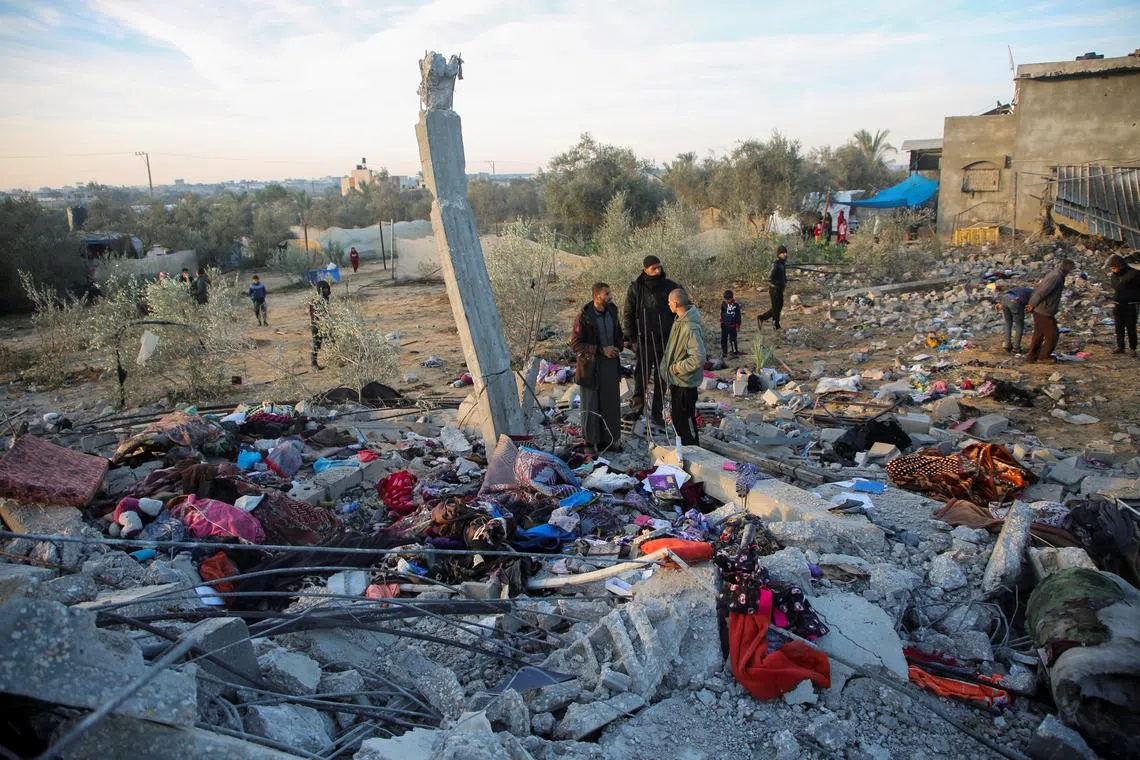Gaza ceasefire: US, Egyptian leaders put focus on ‘coming hours’
Sign up now: Get ST's newsletters delivered to your inbox

Palestinians inspecting the site of an Israeli strike on a house in Khan Younis on Jan 14.
PHOTO: REUTERS
DOHA/CAIRO/JERUSALEM - Negotiators were near to hammering out the final details of a ceasefire in Gaza on Jan 15 after marathon talks in Qatar, and the US and Egyptian leaders promised to stay in close contact about a deal over the coming hours.
More than eight hours of talks in Doha had fuelled optimism. Officials from mediators Qatar, Egypt and the US as well as Israel and Hamas said an agreement for a truce in the besieged enclave and release of hostages was closer than ever
Qatar’s Foreign Ministry spokesman Majed Al-Ansari earlier told a news conference that both sides were presented with a text and talks on the last details were under way.
But a senior Hamas official told Reuters late on Jan 14 that the Palestinian group had not delivered its response yet because it was still waiting for Israel to submit maps showing how its forces would withdraw from Gaza.
US President Joe Biden, whose administration has been taking part alongside an envoy of President-elect Donald Trump, said a deal was close.
Mr Biden and Egyptian President Abdel Fattah El-Sisi talked about progress in the negotiations on Jan 14.
“Both leaders committed to remain in close coordination directly and through their teams over the coming hours,” the White House said in a statement after the leaders’ telephone call.
The two presidents “emphasised the urgent need for a deal to be implemented”.
Hamas said the talks had reached the final steps and it hoped this round of negotiations would lead to a deal.
An Israeli official said talks had reached a critical phase, although some details needed to be worked out: “We are close, we are not there yet.”
Visiting Rome, Israeli Foreign Minister Gideon Saar said on Jan 14 he believed a majority of Israel’s coalition government would support a Gaza deal if one is finally agreed, despite vocal opposition from hardline nationalist parties in the coalition.
Militant group Islamic Jihad, which is separate from Hamas and also holds hostages in Gaza, said it was sending a senior delegation that would arrive in Doha on the night of Jan 14 to take part in final arrangements for a ceasefire deal.
If successful, the phased ceasefire – capping more than a year of start-and-stop talks – could halt fighting that decimated Gaza, killed tens of thousands of Palestinians, made most of the enclave’s population homeless and is still killing dozens a day.
That in turn could ease tensions across the wider Middle East, where the war has fuelled conflict in the West Bank, Lebanon, Syria, Yemen and Iraq, and raised fears of all-out war between Israel and Iran.
Israel would recover around 100 remaining hostages and bodies from among those captured in t he Oct 7, 2023, attacks by Hamas that precipitated the war
US Secretary of State Antony Blinken, who gave a speech in Washington outlining a vision for governing the Palestinian territories after the war
Children, women hostages would be released first
“The deal... would free the hostages, halt the fighting, provide security to Israel and allow us to significantly surge humanitarian assistance to the Palestinians who suffered terribly in this war that Hamas started,” Mr Biden said on Jan 13.
Despite the efforts to reach a ceasefire, new Israeli strikes in Gaza killed at least 15 people on Jan 14 in attacks on Deir al-Balah and Rafah, medics said.
Meanwhile, the UN said it was busy preparing to expand humanitarian assistance to Gaza under a potential ceasefire but uncertainty around border access and security remained obstacles.
Families of hostages in Israel were caught between hope and despair.
“We can’t miss this moment. This is the last moment; we can save them,” said Ms Hadas Calderon, whose husband Ofer and children Sahar and Erez were abducted.
An Israeli official said the deal’s first stage would see the release of 33 hostages, including children, women – including some female soldiers – men above 50, and the wounded and sick. Israel would gradually and partially withdraw some forces.
A Palestinian source said Israel would free 1,000 Palestinian prisoners in the first phase over 60 days.
Israel launched its assault in Gaza after Hamas-led fighters stormed across its borders on Oct 7, 2023, killing 1,200 people and taking more than 250 hostages, according to Israeli tallies.
Since then, Israeli forces have killed more than 46,000 people in Gaza, according to Palestinian health officials.
Both sides have been committed in principle for months to the prospect of a ceasefire accompanied by a swop of remaining hostages for detainees. But Hamas rejected any deal that stopped short of bringing a permanent end to the war, while Israel said it would not end the war until Hamas is dismantled.
Trump’s Jan 20 inauguration is now widely seen as a de facto deadline for a ceasefire agreement. REUTERS


